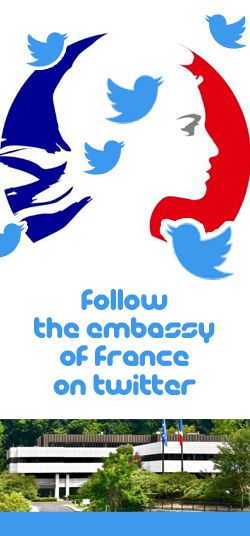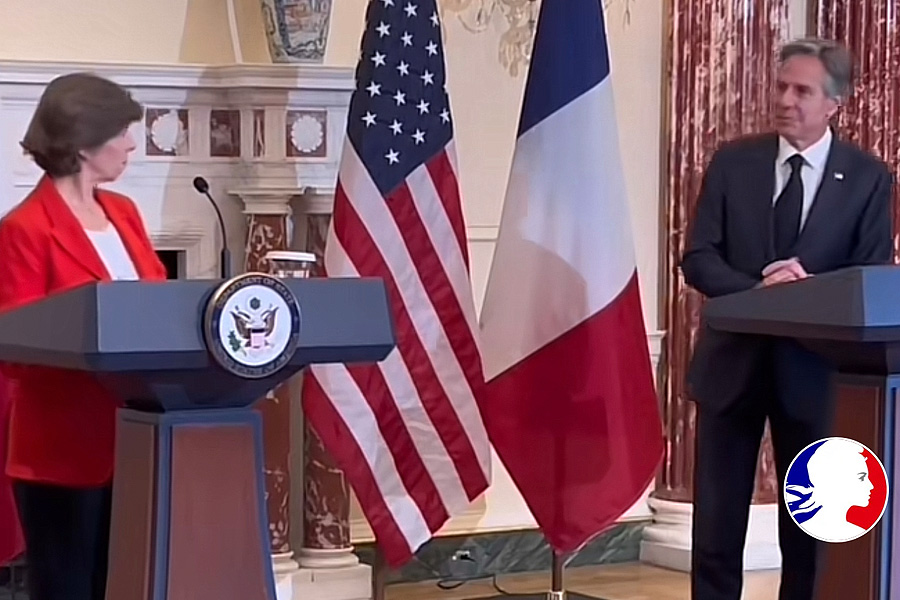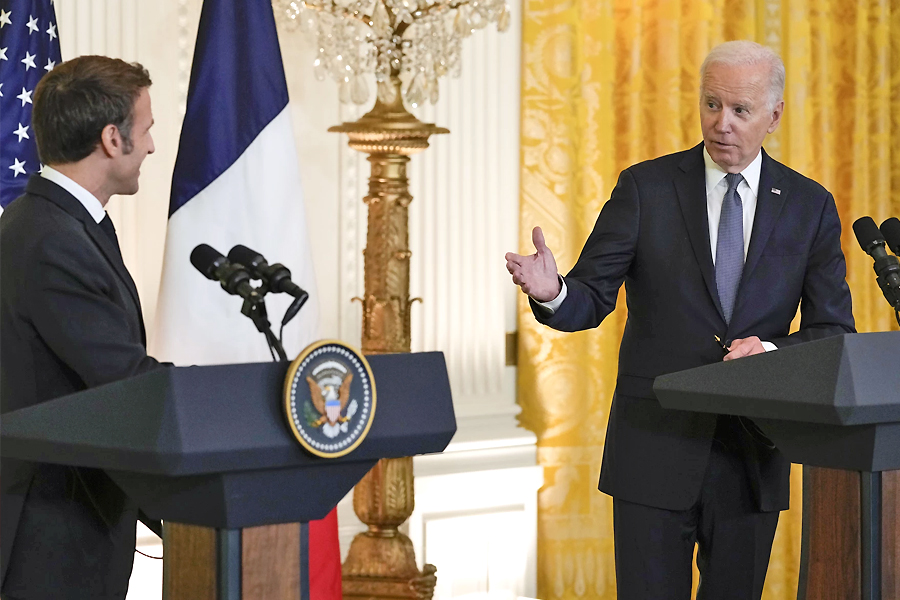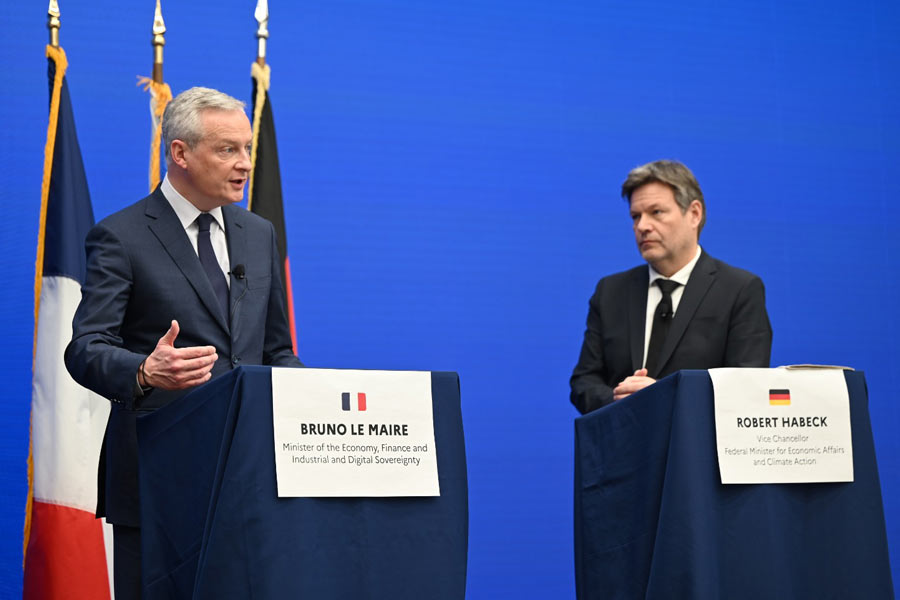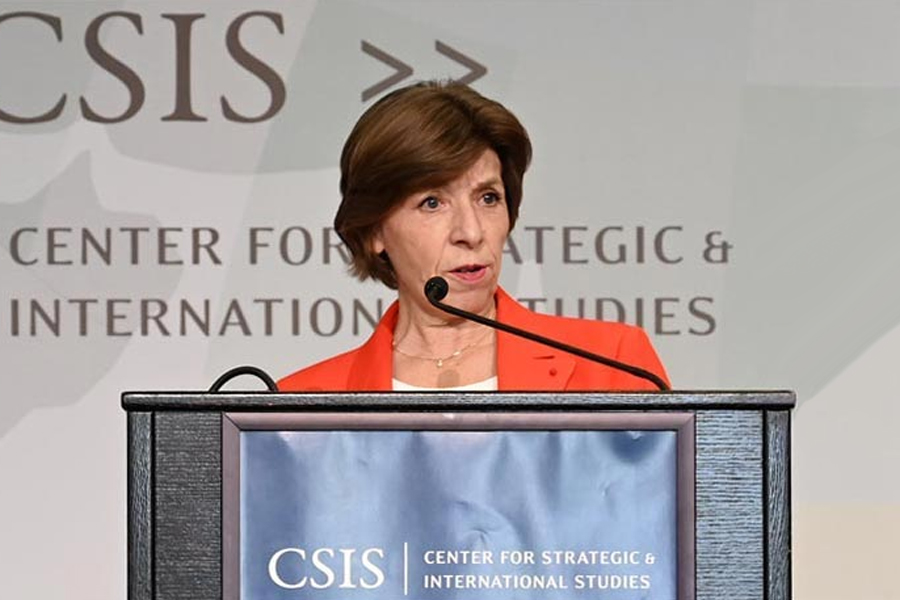Minister for Europe and Foreign Affairs Colonna in the U.S. – Joint press availability with Secretary Blinken at the DoS
Minister for Europe and Foreign Affairs Colonna in the U.S. – Joint press availability with Secretary Blinken at the DoS
Minister for Europe and Foreign Affairs Colonna in the U.S. – Joint press availability with Secretary Blinken at the DoS
SUMMARY
Minister Colonna and Secretary of State Blinken meet the press at the State Department on October 21, 2022
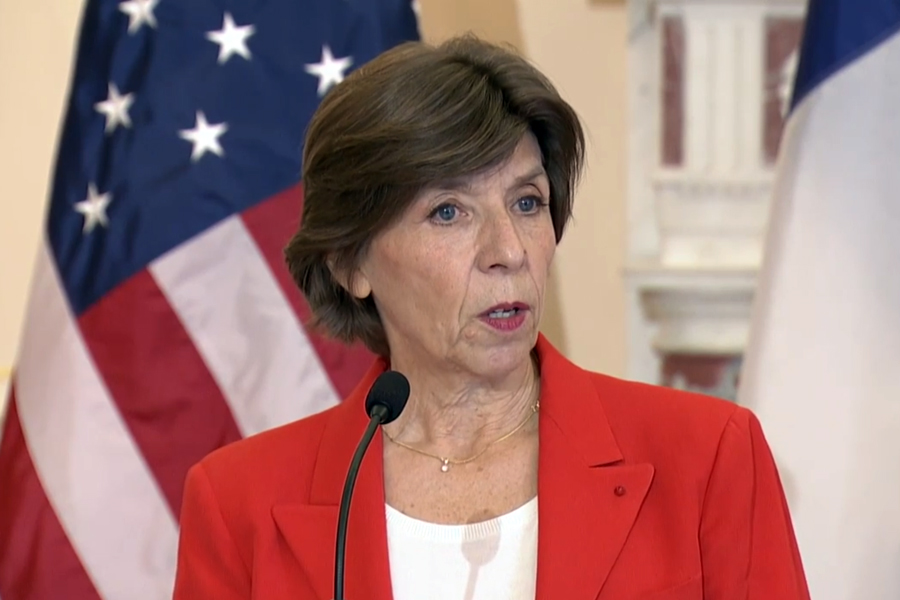
Metadata
Release date: October 21, 2022
Tag(s): Diplomacy, Foreign policy

Metadata
Release date: October 21, 2022
Tag(s): Diplomacy, Foreign policy
Transcript
Secretary BLINKEN – Well, good afternoon. Bonjour, tout le monde.
(Via interpreter) Catherine, I’m delighted to host you here at the State Department and in Washington.
It’s a true pleasure to have my friend and colleague, Catherine Colonna, the French Foreign Minister here in Washington and at the State Department. This is actually the first time that we’ve had the honor of hosting our French colleagues and Catherine here in Washington, despite the fact that we have been closely collaborating over these past five months everywhere from Brussels to Bali, most recently at the United Nations Security Council in the course of a ministerial that the foreign minister presided over on Ukraine.
On virtually every issue that matters to our nations and matters to much of the world, I couldn’t ask for a better partner, the United States couldn’t ask for a better partner. And that was reflected in, as usual, the very productive conversation and meeting that we had today. We discussed our united and unwavering response to President Putin’s brutal war of aggression against Ukraine. In recent days, we’ve witnessed Moscow’s widespread strikes on civilian infrastructure in Ukraine – many carried out using drones supplied by Iran. These strikes have a clear goal: to make the Ukrainian people suffer. And the damage they’re inflicting will make it harder for Ukrainians to heat their homes, find safe water to drink, access the electricity that they need to run everything from stores to hospitals to public transportation.
President Putin thinks that these attacks will somehow break the will of Ukrainian people. Instead, he is only deepening their resolve to defend their country. Moscow can knock out the lights across Ukraine, but it cannot, it will not, extinguish the Ukrainian spirit.
President Putin thought he could divide the transatlantic alliance. Instead, he’s brought us even closer together. The United States is working closely with France and other European allies to help make the decisive shift away from dependence on Russian energy. That means developing more diverse, more reliable, more sustainable sources over the long term and helping our friends get through a winter with heavy energy costs. As I assured the foreign minister today, we are not leaving any of our friends out in the cold.
President Putin thought that he could wear down global support for Ukraine. Instead, countries in every region recognize that when the Kremlin tries to redraw the borders of its neighbor by force, it threatens the rules that underpin security and stability for all nations in every corner of the Earth. That is why 143 countries recently voted at the United Nations to condemn Russia’s sham referenda and reject any attempt to annex Ukrainian territory.
President Putin’s declaration of martial law in parts of Ukraine that Russia purports to annex is just his latest attempt to dress up crimes in the language of law. His move also reveals the lie at the heart of Russia’s purported annexation: if 99 percent of people in these parts of Ukraine want to be part of Russia, why does President Putin have to impose martial law to control them?
The foreign minister and I spoke about how we can continue to provide robust support for Ukraine’s efforts to defend itself and to deliver vital humanitarian aid to the Ukrainian people while also continuing to raise the costs on President Putin and his enablers for their actions. And we reaffirmed our commitment to meaningful diplomacy that can bring an end to the war, even as Moscow continues to demonstrate through its escalatory actions that its claim to be open to diplomacy is as hollow as it’s been since President Putin lost – launched his invasion in February.
We applaud France’s security assistance to Ukraine, including President Macron’s recent announcement of a 100 million euro fund to help supply Kyiv with weapons. France is also host to more than 100,000 Ukrainian refugees, including thousands who have been welcomed into French households.
Of course, our cooperation and our conversation extended far beyond Ukraine today. We’re working closely together to rally international coalitions to meet global challenges which no nation or even group of nations can solve alone. That includes our joint efforts to combat the climate crisis. Next week, we’ll hold the second annual high-level meeting of the U.S.?France Clean Energy Partnership, which is ramping up our renewable energy production.
We’re stalwart partners in strengthening global health security, as was evident in France’s pledge of nearly $1.6 billion at last month’s Global Fund Seventh Replenishment Conference, which President Biden committed to work with our Congress to contribute $6 billion to that fund. This is the international fund that has done so much over so many years to combat HIV/AIDS, malaria, tuberculosis, saving literally millions and millions of lives. Our contributions, the United States and France, the two – to the two largest contributions of any two countries – will allow us to keep making great strides against HIV/AIDS, against malaria, and against tuberculosis.
We’re also working together to advance a free and open Indo?Pacific where all nations can choose their own paths free from coercion. And I thank the minister for France’s support in the negotiations that the governments of Israel and Lebanon reached, a historic agreement to establish a permanent maritime boundary between their two countries. This cooperation and coordination between France and the United States was instrumental in reaching this agreement.
Our relationship is the embodiment of the approach in the United Nations – excuse me, the United States new National Security Strategy, which is rooted in strengthening our alliances and our partnerships, finding new ways to weave them together, and working together to shape a more open, secure, and prosperous world.
The state visit by President Macron in December, the first that President Biden will host during this administration, is both a testament to our unique friendship and the chance to continue to deepen it. I’m very much looking forward to working with Catherine in the leadup to the visit and long after.
With that, Catherine, the floor is yours.
Foreign Minister COLONNA – Thank you. Good afternoon. M. Secrétaire d’État, dear Antony, thank you very much for your warm welcome and for our meeting today, the first in Washington, as you rightly cite. As some of you may know, I’ve happily served as a young diplomat in D.C. some time ago, let’s say. Let me turn to French since the Secretary of State is an accomplished French speaker.
(Via interpreter) Secretary of State, dear Tony, this visit is taking place at a decisive time. Almost eight months ago, Russia brought war back to the European continent by invading illegally Ukraine. It is by doing so threatening our collective security, breaching the fundamental principles of the Charter of the UN and as well as its own commitments, and day after day a trampling upon the laws of war and international humanitarian law given the crimes he perpetrates.
The international order we built collectively is being attacked. It is therefore not a regional stake. That war concerns us all as the Kremlin is blackmailing the world on energy, food, and in addition to its attacks against the very same principle that allow the states, the members of the international community, to live together, like I’ve said before.
This is the reason why we, France, the United States, our allies, our partners made the choice to provide our staunch support to Ukraine by mobilizing all of our levers – political, economic, financial, humanitarian, and military. We said it on a number of occasions, and let me repeat it here: We will stand by Ukraine as long as necessary, because such is the interest of Europe, such is the interest of the United States, and such is very simply the interest of the world, which Russia is seeking to divide by expanding its imperialist and colonial ambitions.
We find strength and efficiency in our unity. The United States once again was here at the historical moment standing by its European friends who share the same democratic values, standing in solidarity with the Ukrainian people and the Ukrainian Armed Forces to allow them to resist, and as we’ve seen for a few weeks to even counterattack.
And I would like to mention not just our unity but also another outstanding unity and underline the fact that the European reaction was historical, because confronted with an unprecedented challenge, the European Union was able to use, and quickly so, its full economic, diplomatic, and military strength. We quickly – very quickly – mobilized all of our instruments to hinder the Russian war effort. We enacted sanctions, individual sectorial sanctions, massive ones, 48 hours after the invasion, and seven times in a row since then.
Given that we even adopted a next package of sanctions, and on Monday, together with my colleagues of the European Union, we also decided to already work on another set of sanctions in case they were necessary.
And together with the Europeans we also decided to gradually put an end to all energy dependency vis-à-vis Russia which was structural and which we fundamentally revised. As recalled by President Macron, the example of gas is very telling given that the European dependency dropped from 40 to 7 percent dependency vis-à-vis Russia for the – the decision taken at the Versailles summit in March. So within a few months we were able to adapt.
As you know, the embargo on coal has been in place since August. The one on oil is coming and will be fully in place on the 5th of December. And these measures are efficient, and please allow me to say because sometimes we hear that they are not. It is part of the propaganda by Moscow. But the Russian economy is impacted, already in recession this year, and we’ll be back to where it were in 2000 within two years. So already 20 years lost and already some major part of the industrial Russian sectors in difficulty – armament, aeronautics, and automobile — so the sanctions are producing, having an impact.
From a military point of view I would like to say as well that the European action is very – is determined, and President Macron recently announced to President Zelenskyy that we would step up our military assistance, delivering some new equipment. And you’re probably aware that we are delivering artillery missiles, munitions, as well as a light tanks. We also decided to train at least 2,000 Ukrainian soldiers in France, and we are developing cooperation in the field of intelligence, which will also be stepped up and will go further.
So we are doing our part, as needed, and we also provide humanitarian assistance and working on emergency reconstruction, and that will be more necessary than ever as winter approaches. We need to help the Ukrainian people to continue to hold on good, and we see that the Russians are targeting energy infrastructure in Ukraine.
We are also welcoming and hosting – even though France is father – is at the west, but we have millions of Ukrainian refugees who are welcome in France and Europe. The kids can go to school. We mainly receive women and children. Ukrainians can work in Europe. It is a matter of solidarity, and we are honoring it. We’re also providing an economic and financial assistance in the thousands of – billions of Euros provided both by the European Union and member states individually.
We’re also providing some concrete support when it comes to the fight against impunity. At the end of September, we were together at the UN Security Council for the first meeting at a ministerial level since the invasion of Ukraine by Russia, dealing with the Russian – the Ukrainian issue, and in particular, the fight against impunity. It was necessary to do so. And what we heard very much showed that Russia is very isolated. I discussed with the Secretary of State we are providing our support to the International Criminal Court and to the Ukrainian courts so that those who perpetrate crimes in Ukraine are prosecuted as shall be because there will be no peace without justice.
France also is supporting Ukraine, standing by its allies, European allies and within NATO. We resolutely contribute to strengthening the deterrence and defense posture of the east flank, standing by the side of our Baltic, Romanian, and Polish friends, and by deploying some additional troops, some land and air forces. And the European Union itself already released 3 billion euros, and we are now at 3.5 billion euros for the – to the decision taken on Monday so that the – what we call the European peace facility can provide Ukraine with what it takes to defend itself. It’s basically some delivery of military equipment.
It is in these circumstances where – and it will probably still be the case in the long run – that I came, dear Tony, to talk about our bilateral relationship, and in order to prepare as well the state visit of President Macron very soon, in early December, thanks to the invitation extended by President Biden. And I understand that it is the first state visit organized by this administration, so please allow me to say that it is an honor which means a lot, both for my president and my country. The president said it once again when I saw him on Wednesday to prepare for my visit to Washington, D.C.
So we are together preparing for this visit in early December, and we intend to use it to show how vivid our alliance is, the oldest alliance, as is customary to often say. We will be working, of course, on implementing the roadmap, defined just a year ago by both our presidents in Rome in the margin of the G20 meeting in the space of energy – in the areas of space and energy, which are strategic sectors for both our countries. And more than ever, we want to build on this new impulse and resolutely move forward in order to meet the challenges around the world. Some of them I’ve just mentioned, but so many others we need to deal with: climate, energy, the Indo-Pacific, the Sahel, or the fight against terrorism.
So I believe that on all of these issues, discussions enable us to show that once again there was an outstanding convergence of views. We see each other often, very often, even though I do not so often come to D.C. And to conclude, the new National Security Strategy that was published this week here in the United States only shows that we share some very close analysis and recommendations. So in this context, we believe that this state visit will once again enable us to show how close we are, how willing we are to work together to meet all of these challenges.
So once again, Secretary of State, dear Tony, thank you for your warm welcome, thank you for our discussion earlier today, and thank you for all of the good work we have been doing for quite a while and as our countries have been doing for a long term since General Lafayette, George Washington, or Benjamin Franklin. And I’ll say he is watching us and keeping a friendly eye on us. Thank you very much.
Mr. PRICE – We’ll now take questions. We’ll start with Kylie Atwood of CNN.
QUESTION – Hi. Happy afternoon, and thank you guys for taking some questions. Secretary Blinken, two questions, one on Iran and one on Russia.
We have heard U.S. officials in recent days be very clear in saying that reviving the Iran nuclear deal isn’t a focus for the United States right now. But is it even possible to salvage that deal? Is the United States willing to strike a deal with the Iranian regime after the death of female Iranian protesters and after Iranian weapons shipments to Russia? And Minister Colonna, the same question to you on the French perspective on that. Is it still in the realm of possibility that France wants to revive the Iran nuclear deal?
Second question, on Russia and diplomacy. This week the Russian ambassador here in Washington spoke about a quiet channel of diplomacy that was used around the time of the Cuban Missile Crisis to avoid a nuclear conflict. Then-Attorney General Robert F. Kennedy and the Russian ambassador here were leading that channel. Has the Biden administration studied that model and considered how to replicate something similar to that going forward to try and trigger a diplomatic path out of this war? Thank you.
Secretary BLINKEN – Kylie, thanks very much. I’m happy to start and then turn it over to Catherine.
First, with regard to Iran broadly, the JCPOA in particular. Look, right now the eyes of the world are on the protests in Iran, the extraordinary courage of young Iranians, especially women, who are standing up at great personal risk for their basic rights, for their basic freedoms, and encountering once again the brutal repression of their government. And as you know, we’ve taken a number of steps in recent weeks in solidarity with them, in support of them, in support of every Iranian who simply wants the freedom to express their views and to have their voices heard.
We’ve taken – we’ve issued sanctions against the so-called morality police that are the ones who, among other things, are responsible for the death of Mahsa Amini, and of course we’ve also taken steps to ensure, to the best of our ability, that through technology, Iranians can continue to communicate with one another and with the outside world. And that goes to the work that we did to make sure that we had a license in place that allows technology companies as best they can to get the necessary communications technology to Iranians. So that’s where I think the world’s focus is.
Having said that, with regard to the JCPOA, two things. First, there’s no imminent agreement, and there’s no imminent agreement because the Iranians continue to inject extraneous issues into the discussions about the JCPOA. And as long as they continue to do that, there is no possibility, no prospect for an agreement. We continue to believe that a diplomatic resolution to the challenge posed by Iran’s nuclear program remains the best way forward, and we continue to be determined that Iran never acquire a nuclear weapon or the capacity to build one, including the fissile material necessary to fuel one.
The JCPOA, when it was in existence, was successful in putting Iran’s program – its nuclear program – into a box. And unfortunately, in leaving that agreement, it’s allowed Iran to get out of the box that it was in in terms of its nuclear program. We continue to have an interest in seeing that program put back in the box. We continue to believe that diplomacy is the best way to do that. But in this moment there is no prospect for an agreement – again, because Iran continues to inject extraneous issues into the conversations that we’ve had. And the European Union, our partners – France, Germany, the United Kingdom – are all in the same place when it comes to that.
The last thing I’ll say on this: With or without a deal – and this was true when the deal was in effect; it’s been true since the deal has no longer been in effect – with or without it, we will continue to take every step necessary to deal with Iran’s activities, Iran’s aggression, whether it’s in the Middle East or beyond. And we’re seeing that now with the provision of UAVs to Russia to help it continue its aggression against the Ukrainian people.
With regard to Russia and diplomacy, before I turn it to Catherine, we have been very clear that whenever we have something that it’s important to communicate to the Russians, we’ll do it, and we’ve done it. I’ve had occasion to speak to Foreign Minister Lavrov on specific issues that were important to our own security. Other colleagues – including the Secretary of Defense, National Security Advisor – have communicated with their counterparts, and we’ll continue to do that.
When it comes to diplomacy to end the war, it depends entirely on whether Russia gets to a place where it’s actually interested in stopping the aggression that it started, and we’ve seen no evidence of that in this moment. On the contrary, we see Russia doubling and tripling down on its aggression: in the last month, the mobilization of hundreds of thousands of Russians; horrifically, cannon fodder that Putin is trying to throw into the war. For the 300,000 Russians that had purportedly been mobilized, more than that number have fled the country to avoid having to go to Ukraine.
Second, of course, this effort to have the sham referenda and then annex Ukrainian territory, which was rejected by virtually the entire world, 143 countries; now, a horrific bombing campaign against critical civilian infrastructure, against – as Catherine said – the facilities across the country that are trying to generate electricity and power for the country to keep the lights on, to keep people warm during the winter – brutalizing the Ukrainian people. So every indication is that, far from being willing to engage in meaningful diplomacy, President Putin continues to push in the opposite direction. The fundamental problem he has is that not only are the Ukrainian people extraordinarily courageous and resilient, they’re also very successful in not only repelling the aggression but taking their land back.
And it all comes down to what I’ve been saying for some time, which is that, with the assistance that we’ve been providing, with the incredible courage of the Ukrainian people, the fundamental difference maker is that Ukrainians are fighting for their country, for their land, for their future. Russia is not. The sooner President Putin understands that and comes to that conclusion, the sooner we’ll be able to end this war.
QUESTION – (Off-mike.)
Mr. PRICE – Kylie, we need – we need to go on to the Foreign Minister, please.
Secretary BLINKEN – We – we’ll – we consider and will consider every means to advance diplomacy if we see an opening to advance it by whatever means. Of course, we’ll always look at it. But as I said, in this moment, Russia shows no signs of being willing to engage in meaningful diplomacy by any means.
Foreign Minister COLONNA – Thank you for your question regarding Iran. I say we’re pretty much aligned on this one as well. Let me switch to French on the JCPOA.
(Via interpreter) Regarding the JCPOA, the Secretary of State responded in detail. A proposal was made to Iran, so that is some very long negotiations. The proposal aims at dealing with the Iranian nuclear situation, which is serious – very serious. This proposal has not so far been approved by Iran even though we told them there would be no better offer on the table and that it is for – it belongs to Iran to take a decision and to accept this offer if they can. And President Macron went as far as meeting President Raisi in the margins of the UN General Assembly in New York to find out about his mindset. And unfortunately, we could only acknowledge that Iran at the moment was not willing to accept this proposal. So it is for this country to make a decision.
Second, and like the Secretary of State, I would like to say how concerned we all by the violence that is being used by the Iranian authorities against demonstrators, people who demonstrate peacefully so – on a number of occasions. And quickly we condemn this brutal repression against demonstrators. We also recalled the fundamental right of citizens to demonstrate peacefully, to peacefully express their opinion. We also demanded all citizens to be set free. There are a number of French citizens being held in Iran and others. We took a number of sanctions on behalf of the European Union against those responsible for the repression.
So that’s been done, and more recently this week, given the support provided by Iran to the criminal action of Russia in Ukraine by way of kamikaze UAVs that were used again only a few days ago, we have at a ministerial level adopted some additional sanctions – and they are now enforced – sanctions against those responsible for these armament programs.
And let me say that these UAVs that were used once again this week – against the civilian – civil infrastructures and civilians in Ukraine – this is not only in breach of the commitments by Iran in accordance with the United Nations Security Council resolution, but it is also a war crime because they’re targeting civilians. So this is the reason why we took sanctions.
Mr. PRICE – Sébastien Blanc, AFP.
QUESTION – Thank you. I have two questions, one for each of you. Mr. Secretary, there are currently tensions between France and Germany. Britain is in turmoil. We have a new prime minister in Italy with a coalition who is – who disagrees on Ukraine. Are you worried about a lack – a possible lack of cohesion within Europe at a time when cohesion is very much needed against Russia?
(Via interpreter) And Madame la Ministre, is France going to send a military force or a police force to Haiti, as requested by Prime Minister Ariel Henry? Thank you very much.
Secretary BLINKEN – Thank you. Everything I’m seeing is the exact opposite of a lack of cohesion. I think we’re showing tremendous solidarity, we’re showing tremendous coordination, tremendous cooperation in everything that we’re doing together to support Ukraine, to continue to put pressure on Russia, as well as to shore up our own alliance, NATO – defensive alliance. We’ve seen that in the actions that the EU has just taken, including additional sanctions. We see it in the support that just a week ago more than 40 countries came together through the Ramstein process to continue the coordination in supplying weaponry to Ukraine to allow it to defend itself and to take back its territory. We see it in the assistance that the European Union now is providing directly to Ukraine, including direct budgetary support that will help them get through this economic challenge that they’re facing largely because of the Russian aggression.
So everything I’m seeing, both in terms of my own conversations and, importantly, the President’s conversations with his counterpart, as well as in the action that’s being taken, speaks to incredibly strong cohesion, solidarity, commitment to this common effort to help Ukraine defend itself, to stand up not only for Ukrainians against this aggression, but to stand up for the very principles that are at the heart of the United Nations Charter and that are important for countries everywhere around the world – the basic idea that one country can’t change the borders of another by force, that it can’t simply seize the land it wants or eliminate the independence or sovereignty of a country just because its leader so decides.
Together, Europe, the United States are standing strong in defense of those basic principles, and that’s something that’s important not just to our own countries but to countries around the world. And it was further manifested by the fact that with a resolution that was led by the European Union at the UN General Assembly just a week ago, 143 countries stood up together in opposition to what Russia is doing in Ukraine.
Foreign Minister COLONNA – (Via interpreter) Thank you, sir. We support the search for stability for Haiti, a country which is once again plunged into violence and poverty still, and we are well aware of the seriousness of the situation which is in the hands of criminal gangs which are only worsening the situation. So in this respect I would like to commend the adoption today at the Security Council of a unanimous resolution, and it is also interesting when we consider – when we look at the situation of the global order. So I would like to also commend the efforts deployed by the United States for the adoption and – the quick adoption of this resolution.
If an international support force to the police were to be set up, France would contribute probably materially, even though we still – by way of equipment we will still have to work on the details. But what is important in the moment is that we continue to deploy efforts at the United Nations for such a force to be deployed. At the moment we’re not yet where we should be to contribute to resolving the problem of Haiti.
Mr. PRICE – Missy Ryan, Washington Post.
QUESTION – Hi, thank you. You both mentioned the assistance that France is providing to Ukraine. However, there are some in the U.S. Congress who are increasingly voicing concerns about the fact that the United States is giving so much more economic and military aid to Ukraine than many of its major allies or than all of its major allies in Europe, while countries like France, in turn, are giving less proportionally than countries – smaller European countries like Estonia. Mr. Secretary, do you think that countries – larger European countries like France and Germany – should be increasing their contributions to Ukraine?
And also for you, Mr. Secretary, last week President Macron in an interview said that France would not use nuclear weapons in retaliation for a potential Russian nuclear strike on Ukraine. Do you think it’s a good idea to preemptively take that off the table?
And for you, Madam Minster, can you tell us how President Macron’s comments ruling out nuclear retaliation makes France and Europe safer? And do you think there should be a way to take into account the significant contributions that France and other European countries have made in taking in and taking care of Ukrainian refugees to help people in the United States, for example, understand how the contributions may not be what they seem to be on the face of them? Thanks.
Secretary BLINKEN – Thank you, Missy. With regard to assistance to Ukraine, first, I think it’s fair to say that we are making together an extraordinary collective effort. And again, you see that in the security assistance that’s being provided by Europe and by the United States alike. You see it in the economic assistance; you see it in the humanitarian assistance that’s being provided. And if you break it down and add it up, Europe is doing extraordinary things. I just mentioned that this week we saw the European Union moving forward with direct budgetary support in the billions of dollars for the Ukrainian Government, something that we’ve been doing over the summer, but it’s very important and very timely that Europe is now picking up this baton, very important to Ukraine as it tries to get through the winter and get through the months ahead.
Similarly, when it comes to the defense support to Ukraine, I could cite what France has done and continues to do, which is absolutely vital to the Ukrainians being able to defend themselves and take back territory. That continues; we talked about it today. And the same thing on the humanitarian support. It’s also true that there are literally millions of Ukrainian refugees in Europe being welcomed by a whole variety of European countries – the kids going to school, the parents being able to work and getting support. That’s significant; that has to be added to the equation. So this is a collective responsibility that we are undertaking collectively, and one of the things that we’re working on virtually every day is making sure that we’re coordinated, making sure we’re being responsive to the needs, and doing it together. So I’ve been impressed with the – this collective effort. And based on our conversations and based on conversations with other European colleagues, I have no doubt that that will continue.
When it comes to nuclear weapons, two things. There has been loose talk coming from President Putin and from other Russians about this. It’s the height of irresponsibility, particularly coming from a member of the United Nations Security Council. It’s something that we look at very carefully and that we take very seriously given what Russia has already done in Ukraine. We’ve to date seen no reason to change our own nuclear posture, but we will track it very carefully. And let me just say for our part – I’m not going to speak for France or for anyone else – we’ve communicated very clearly, very directly to Russia the consequences for any use of a nuclear weapon.
Foreign Minister COLONNA – (Via interpreter) I shall continue with this first topic before moving on to the refugees. Madam, echoing what the Secretary of State just said, when one talks about nuclear weapons, one should talk with genuine measurement, if not prudence. So once again I would like to say that we’re calling upon Russia to act as a responsible power. It is a nuclear power and accordingly it has some specific responsibility: nuclear weapons of deterrence. And I think one we recall – once we recall that nuclear weapons are weapons of deterrence, it says it all. As to the French doctrine recalled by the president of France, that is – this is the one.
Madam, you also asked about the fact that Europe is welcoming millions and millions of refugees from Ukraine, usually women and children. They are being well – I believe they’re well received. And by hosting them, well, it is a matter of solidarity, it is a matter of humanity. So of course it comes at a cost, but it is normal. And I believe when it was assessed that it is costing some 17 of 18 million euros already, and it will continue. But the – we will need – the member states shall continue to support to maintain this effort, but I will not use that as an argument. We should speak about the facts, and like the Secretary of State said, France, the European Union in itself, its member states all sharing – now shouldering their responsibility. They’re already contributing thousands of millions – billions of euros to microeconomic support, financial support, humanitarian support, et cetera, not to mention the welcoming the refugees, as I just said.
And one last word. Let us not play in the hands of the Russians. We’ve been incredibly united and they bring – this is our strength. And I would like to call upon each and every one to say that we stand together to defend the principles of international law, according to which an order based on the rules shall not be challenged the way it is being by Russia. We shall clearly say what is at stake. It is not just the fate of Ukraine or the security of the European continent. It is a matter relevant to all and every single country around the world.
Mr. PRICE – Keely Sullivan, France 2.
QUESTION – Yes. Thank you, Minister Colonna, Secretary Blinken. Mr. Secretary, if I may, I would actually like to ask you a question in French.
Secretary BLINKEN – Allons-y.
QUESTION – Okay, okay. (Via interpreter.) I would like to ask about a statement that came out of the White House yesterday, according to which there are some Iranian military present in Crimea supporting the Russians with a number of UAV strikes in Ukraine. Do you consider some new sanctions by the United States or some parallel response? And Madam as well, Madam Minister, further to the sanctions approved by the European Union, do you consider something else further to the statement that came out of the White House?
Secretary BLINKEN – (In French.)
(In English) First, we’ve been warning going back to July about Iranian plans to provide UAVs to Russia for use in Ukraine, so this is something that we have been seeing in the works and now we’re seeing in reality. Back in September, a month ago, the Russians moved UAVs that they acquired from Iran into Crimea to use against the Ukrainian people. And, as we’ve said, Russian military personnel in Crimea have been piloting these Iranian UAVs, using them to conduct kinetic strikes across Ukraine, including strikes against Kyiv just in recent days and against all sorts of civilian infrastructure and civilians themselves. That’s truly deplorable. And yes, we also see Iranian military personnel on the ground in Crimea who are assisting Russia in these operations. We believe that Russia’s received dozens of these UAVs so far from Iran, with more potentially in the works.
But beyond consistently warning about this, going back well before the Russian aggression, we’ve been taking action against the provision of UAVs by Iran to anyone that’s using them in an aggressive and dangerous way, whether it’s in Yemen, whether it’s in Iraq, whether it’s potentially against Israel, and other countries. We’ve sanctioned the entities that we can find that are involved with this. There are UAV networks, including sanctions going back to last October. We are interdicting the illicit traffic in arms, including UAVs, wherever we can see them, find them, and interdict them. We’re doing that in coordination and cooperation with other countries. And we’re continuing to build up the defenses of our partners, including in Ukraine, against the use of UAVs or any other kinds of weapon systems that Iran may be engaged in.
So this is a day-in, day-out effort. It goes back a long time. But it’s now spread to Ukraine through Russia, and we’re determined to stand against it wherever it’s happening.
Foreign Minister COLONNA – (Via interpreter.) Thank you, madam. As to the sanctions, like I said, we already adopted eight series of sanctions against the Russian war machine and warmongers, and the sanctions will be stepped up if necessary. And I was saying as well that on Monday, we decided to start working on what could be done if it were necessary.
But your question was in relation to Iran, and here again let me recall what we said before. The European Union itself took sanctions against those responsible for repression in Iran, and more recently this week, sanctions against Iran due to the delivery of military equipment to Russia used against Ukraine in breach of the commitments taken by Iran and its commitments vis-à-vis the international community. There is a UN Security Council resolution that prohibits that, and also for being the accomplice of the war crimes committed, perpetrated by Russia in Ukraine.
So these sanctions were decided at a political level on Monday. They were finalized yesterday. And they are legally in force as from today.
Foreign Minister COLONNA – Thank you.
Secretary BLINKEN – Thank you. Thanks, everyone.
Foreign Minister COLONNA – Merci. Thanks, everyone.
Secretary BLINKEN – Merci.
Related posts
